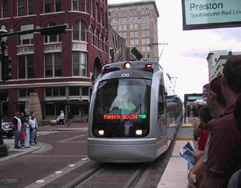Truckers may well be the unsung heroes of the U.S. economy. They deliver 70% of all freight tonnage, while 80% of U.S. communities receive goods exclusively by truck. One out of every 13 people working in our private sector is employed in a trucking-related job across manufacturing, retail, public utility, construction, service, transportation, mining and agricultural sectors. Of those, 3.5 million are commercial drivers. (Statistics from “Trucking and the Economy (2.6mb PDF)” from the American Trucking Associations.)
There are probably many myths about trucking and truck drivers. Reader Noble McIntyre, an attorney who works with truckers, recently submitted the guest post below addressing three myths often perpetuated by through the entertainment industry.
Three Trucking Industry Myths, by Noble McIntyre
The American trucking industry has provided consumers with everything from fresh fruit to new cars for nearly 100 years. During World War I, the military used trucks extensively to transports personnel and equipment. As the number of paved roads began to increase, trucking became more prevalent in the 1930s, and in the post-depression era. But it wasn’t until the construction of the national highway system began in 1956 that the trucking industry really took off, and became an integral part of the country’s economy.
Over the last few decades, several myths about the trucking industry have cropped up, and continue to be perpetuated by the media and the entertainment industry. Here are a few of those myths, and the truths that counter them.
1. Truck Driving Gives You a Lot of Freedom
Driving the open highways, traveling to new destinations, and meeting new people may seem, on the surface, like a freewheeling lifestyle. Not having to go into an office every day, not having to wear business attire, and not having a boss looking over your shoulder can all be attractive points of a career in trucking. But the truth is, the road can get old after a while. And truck drivers are not driving convertibles, with the wind flowing through their hair. They’re stuck in truck cabs for several hours a day, trying to meet delivery deadlines. They’re away from their families, often for weeks at a time. They miss holidays, important family events, and other activities people take for granted. They may not have to sit in a cubicle every day, but they’re not jet setters by any means.
2. Truck Drivers Use Drugs
Just as Hollywood perpetuates stereotypes about women, relationships, and race, the movie industry hasn’t done many favors for the trucking industry. Truckers are often portrayed in film and on television as outlaws, violent criminals, and drug abusers. The Omnibus Transportation Employee Testing Act of 1991 mandates drug testing (as well as alcohol testing) of employees in several transportation industries, including trucking. Transport companies routinely perform drug testing of their drivers. If drivers fail a drug test, they aren’t allowed to drive. Just as in any field, there are exceptions, but truckers in general are responsible employees, well aware of the tremendous responsibility they shoulder when they get behind the wheel of a semi.
3. Truck Drivers Are Poor
Truck driving may not be as lucrative a career as medicine or law, but even the lowest truck driver salaries are well above minimum wage. According to the Bureau of Labor Statistics (BLS), as of May 2010, the average trucker salary was $37,770. The BLS also said the top ten percent of truck drivers earned more than $57,480. The bottom ten percent earned less than $24,730, and while this is not much higher than the 2011 poverty level of $22,350, it can be assumed that most of those lower salaries are for entry-level positions. Truckers may not be wealthy, but for the most part, they earn enough for a comfortable standard of living.
Next time you see a semi-truck on the road, think about the driver behind the wheel, and realize he—or she—is a person just like you, working toward a goal, delivering goods you depend on, and looking forward to getting back home to family.
…
Larry Ehl is the founder and publisher of Transportation Issues Daily. In the public sector, Larry was Federal Relations Manager for Washington State DOT; Chief of Staff to US Senator Slade Gorton; and was twice elected to the Edmonds School Board.
Tags: Larry Ehl, McIntyre Law, Noble McIntyre, Oklahoma, Transportation Issues Daily






 RSS Feed
RSS Feed
Great article
We appreciate truckers!